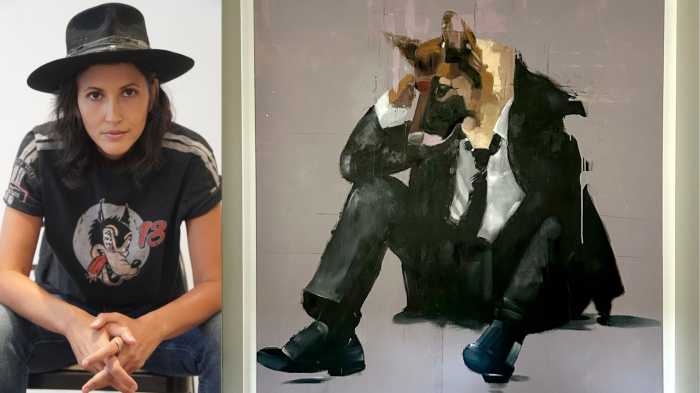By Jerry Tallmer
New work sheds light on Mattachine Society founders
Two men who barely know one another strike up a conversation — in a joint called The Chuckwagon that looks like a John Wayne hangout in the Wild West of the late 1880s. But this isn’t John Wayne’s Wild West of the late 1880s. It’s Los Angeles, and the year is 1950.
You remember 1950. Well, I do. Joe McCarthy. J. Parnell Thomas. HUAC. The blacklist. Korea. Eisenhower. Don’t make waves. The Silent Generation. The slip of a lip can sink your own ship.
One of those two men in the Chuckwagon is large, aggressive, bluff and blustery. He is 39 years old and his name is Harry — Harry Hay. He was born in London, England, though you’d never know it.
The other man, 10 years younger, is slender, handsome, graceful, quite charming, and speaks with a slight Viennese accent. His name is Rudi Gernreich.
As they are discussing, of all things, the carving of cameos, Rudi suddenly says: “Your foot, Harry.”
HARRY: What?
RUDI: Is on top of mine.
HARRY: And therefore protecting you.
RUDI: Almost crushing me.
HARRY: Should I stop?
RUDI: Don’t be ridiculous. I said: “Almost.”
These two anonymous men will go on to give history a small but telling shove as co-founders — almost 20 years before Stonewall— of the first stand-up, unashamed organization of homosexuals in this country. It was called the Mattachine Society, and its story (or an imaginative dramatic riff on its story) is told in “The Temperamentals” — a play by Jon Marans that’s in previews at the Barrow Group Studio Theater on West 36th Street, toward its May 4 world premiere.
In those days as in these days, there were a lot of code words, and “temperamentals” was a code word for those who were soon to be further coded as gays.
It was an assignment from San Jose Rep to write a stage adaptation of Studs Terkel’s “Coming of Age” that led playwright Marans to explore the birth of the Mattachine Society.
“That book is about a bunch of radicals and anarchists all more than 70 years old but still kicking and screaming and loving a good fight. One of them was Harry Hay. When the play was done under the title ‘Legacy’ — a terrible title,” Marans says with a grimace — “every time the Harry Hay character came on, he stole the show.”
Had Marans, himself gay, ever before researching the subject heard of the Mattachine Society?
“Nothing. Zero. Nothing.”
Jon Marans, whose “Old Wicked Songs” was a big hit in the mid-1990s — first at the Jewish Repertory, then at Promenade, then around the world — needed a hook for the Mattachine play, and found that hook in Harry Hay (1912-2002).
“He was a very difficult human being, who alienated a lot of people. He had been a Communist in the 1940s, and nobody wanted to work with him. They thought his whole idea of a homosexual organization — that unless ‘temperamentals’ defined who they were, the world would define them — was lunacy.
“And then he met and fell in love with this young guy, Rudi Gernreich [1922-1985] — a young Jewish guy out of Vienna,” says Jon Marans, a startlingly youthful 52-year-old Jewish guy out of Pittsburgh, Pennsylvania, and Silver Springs, Maryland.
“Rudi had left Vienna when he was 16 years old, his family had been wiped out in the Holocaust, and here he was, in Hollywood” — on track to becoming world famous as the fashion designer who created, among much else, the women’s topless bathing suit (one of which is now immortalized behind glass at the Metropolitan Museum of Art).
“When Rudi started to become successful, he realized that he was going to have to go back into the closet. And he stayed in the closet, kept his secret, for the next 35 years.”
That, too, is drama.
Somebody who is not in Studs Terkel’s’ “Coming of Age,” but ought to be, is Nelson Marans, organic chemist, husband of Rhoda Marans, father of Jon Marans.
“My father is the most angry public letter writer in the Washington, D.C., area. He has letters in The New York Times a lot. My parents,” says their son, “are alive and delightful.”
He says the same about “Temperamentals” director Jonathan Silverstein — “such a smart, collaborative guy. He went to a Quaker school, which was all about community and family. That’s what this play is all about,” says the man who wrote it. “Forming a family.”





































